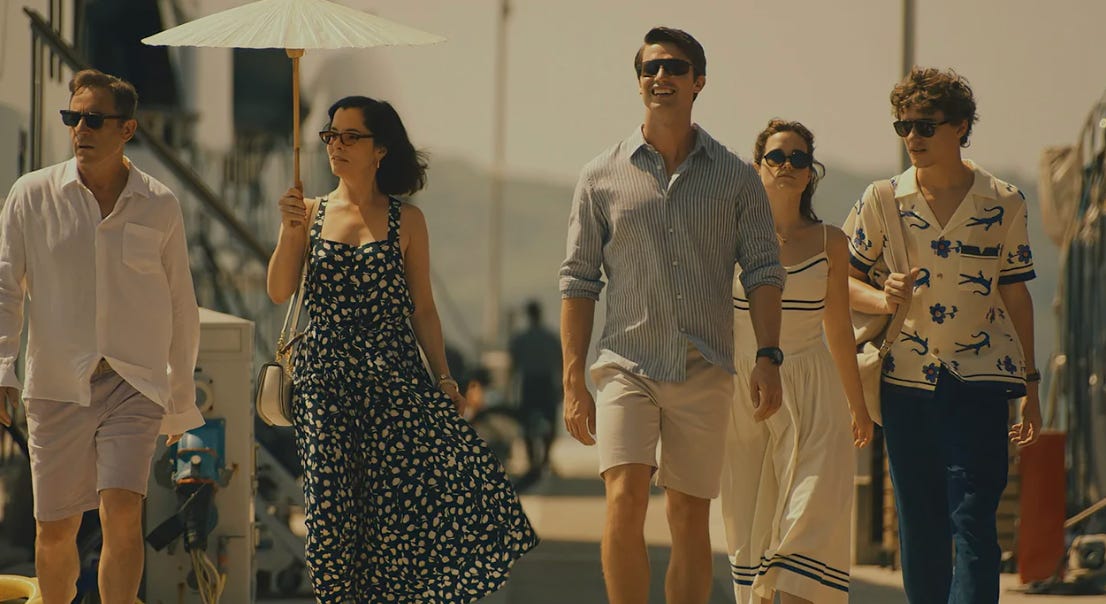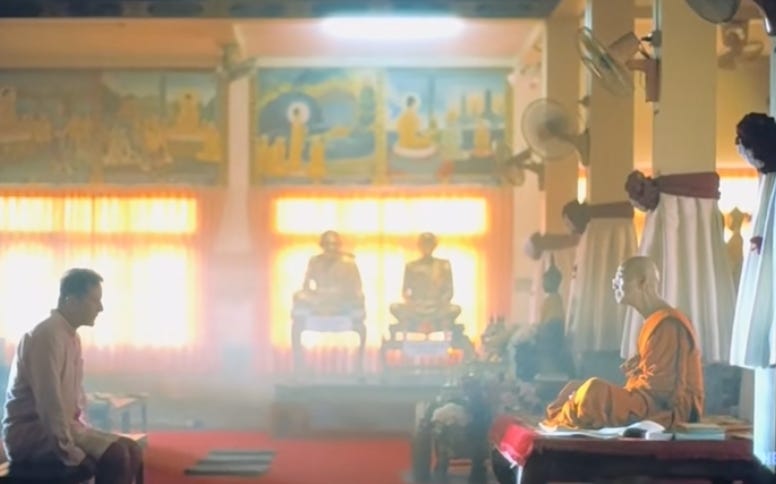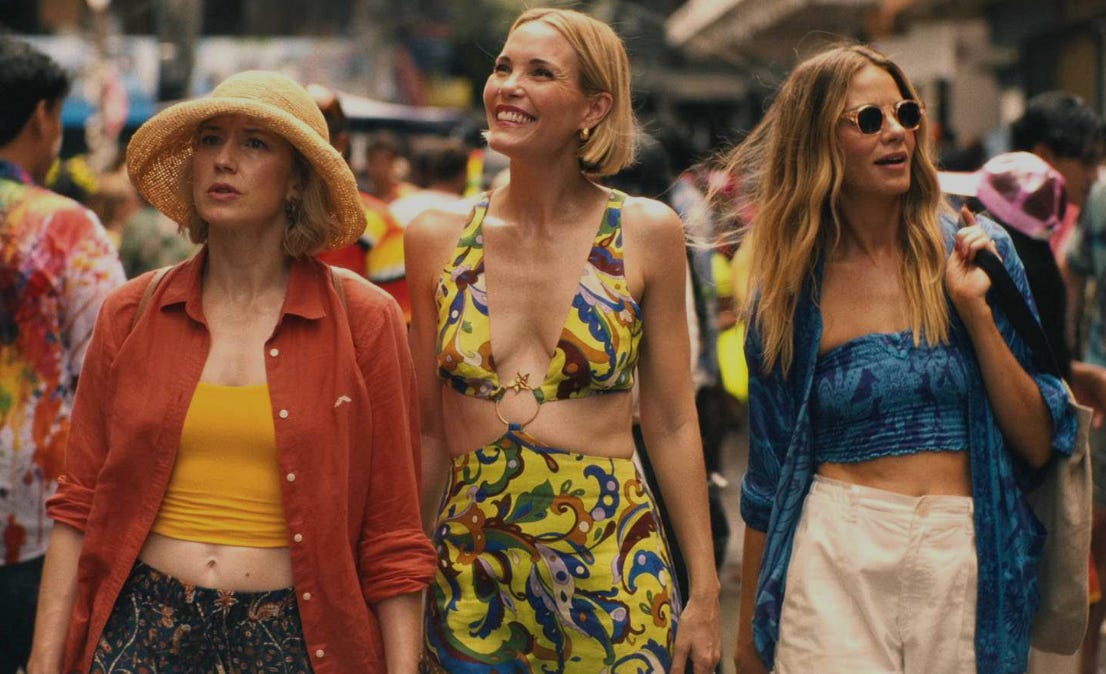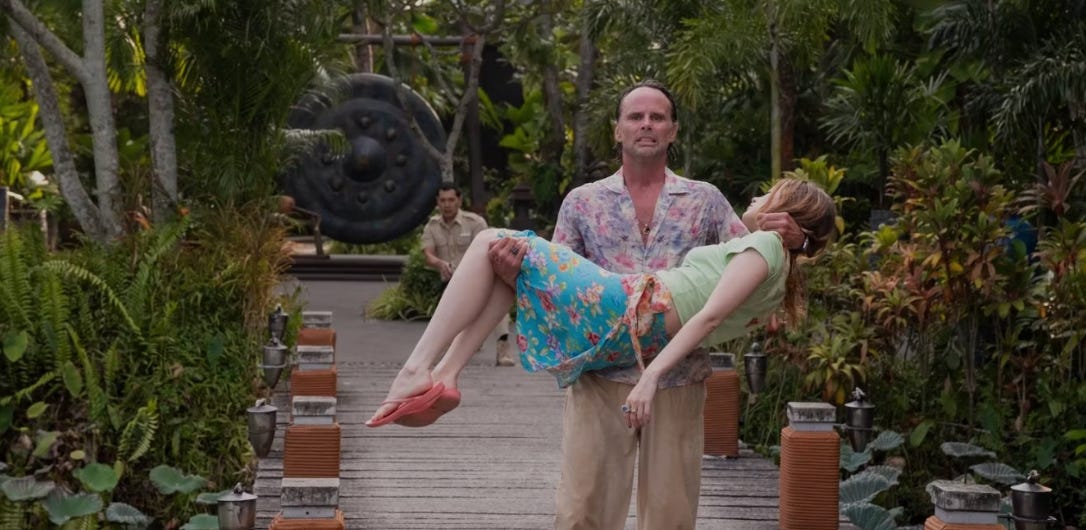Hi and welcome back to Inner Space Studio, where we are talking about The White Lotus this week. I hope you watched the latest season of the pop culture phenomenon. It’s not often that a television series explores the theme of spirituality, and it allows us an excellent opportunity to relate to thoughtful ideas in an accessible way. Please note that there are spoilers ahead, and if you have not watched and decide to, this show is not always light TV viewing.
Mike White, the visionary and brainy creator, has been open about the show's exploration of themes related to Buddhism. He studied Buddhism during a challenging period in his life, and while he is not Buddhist, he has found its principles beneficial. Same, Mike! Now that we’ve had time to reflect, I thought I would unpack some storylines that relate to our well-being.
Who are we at our core?
We all take on superficial identities. We are raised in places and by people with overt and implied expectations of us. Maybe you had a teacher who said something that motivated you, or perhaps you were given a label. The smart one. The lazy one. The pretty one. The difficult one. There were big expectations on you, positive, negative, or none at all, which is also a type of expectation. Cultural expectations vary widely from place to place, and we also live with the weight of those. Who would we be if all that went away? What would it be like to find out?
Life is about to change for almost everyone we meet at the White Lotus resort. Who will they be on the other side? Who are they when the stories they have told themselves shift or disappear? What choices will they make when confronted with a crisis of identity? What’s beneath all of that? Who are we at our core, anyway? Will anyone reveal their true self, and if so, what will that look like, and will it last? This, to me, is the real drama.
Take the Ratliff family from North Carolina. Remember the boat scene where Tim, drunk on whiskey and lorazepam he stole from his wife’s Gucci handbag (that she hid behind a pillow- the detail on this show is hilarious), bragged about his grandfather being the governor of North Carolina and his father being a pillar of the community? He didn’t say it outright, but we feel the heaviness of the expectations placed on him. He even wore the weight of expectation on his body. You can see it in the way he slumps. He is keeping a secret that will take him and his family down.
Who will the Ratliffs be without their wealth? Tim’s true self is about to be revealed, and the mere thought of it is so destabilizing that he wonders if life is worth living without the trappings of material success. He roots around, testing how his family might respond. His wife, Victoria, says that she has gotten so used to her easy life that she would rather be dead than have no money. Piper thinks she wants to leave it all and study at the monastery but later realizes she can’t meditate without her Diptyque candle. While Lochlan says he could be homeless and live on nothing, Saxon, the only one who seems to have any clue that his father is unspooling, has no idea who he is without his and his father’s success. He says so to his father, outright, “If I’m not a success, then I’m nothing.” Timothy Ratliff’s buffoonery as he unravels isn’t just entertainment for viewers, it’s a life lesson in facing your demons. How will he respond? How would you? Tim is almost willing to burn his whole life and family down rather than face this shift in identity.
The expectations placed on Rick are different. There seem to be none. He was raised by a single mom who told him on her deathbed the name of the man who she claimed killed his father— the man Rick has come to Thailand to “confront.” Tragically, Rick has lived his life identifying as a victim, wanting only to understand his origin story. There is a palpable sadness and distractedness to Rick. He is never fully present, as he is obsessed with his past. Chelsea even says to him, “Stop thinking about the love you didn’t get. Think about the love you have. I’m right here.” When Rick confronts the man he thinks killed his father, the cloud lifts. Visually, we see a halo of light shining on him. When Rick only shoves Jim (rather than killing him), we watch as he realizes that Jim holds no more power over him. He returns to the beach and Chelsea, free and ready to move on—for a few hours anyway, until the same man confronts him and insults his mother.
You cannot outrun pain
A big theme of the show is how unsettled most of us are—how we are all filled with worry, anguish, and, importantly, looking to fill a void. The Ratliffs try to fill the void with comfort and money. There’s a scene where a Buddhist monk sits with Tim. The monk explains why so many people turn to spirituality. So many of us have lost our connection to nature, each other, and ourselves. The monk reminds Tim that humans tend to run from pain toward pleasure, only to find more pain. No matter how many purchases and pleasures you accumulate, “You cannot outrun pain.” How many possessions are enough? How much partying to escape boredom and trouble? Will it ever end?
No one embodies this better than Frank, Rick’s old friend/business partner. Frank’s monologue is one of the most memorable I’ve seen on television, probably ever, and not just for the salacious details of his endless pursuit of pleasure. Frank woke up! He realized that his cravings were boundless and had overtaken his life. Seeking change and healing, he became sober and celibate and checked into a monastery, as he wanted to know who he could be without those desires. When Frank relapses, it is a setback, sure, but we see him back at the monastery as the series winds down. The only way through is to face the music and, if necessary, begin again.
What we do affects other people
One of the toughest parts to watch is the impact of small decisions the characters make that affect not just themselves but also each other. The cast is connected in ways we could not see when the show began.
Certainly, we see the deep connection and interplay in the three friends travelling together and the drama that ensues as they navigate their stay. They compare, judge, and talk behind each other’s backs, and at one point, Lauie wonders if they have really changed at all. Does it matter? Or is it enough that they anchor each other? As Laurie says in her heartfelt speech (just give her the Emmy now) at their last dinner together, it’s a gift just to have a seat at the table—to be there to bear witness to each other’s beautiful lives.
But not every connection is so pure. We watch uncomfortably as Gaitok, who adheres to a Buddhist form of nonviolence, faces the reality of his (ironic) job as a security guard. Bit by bit, he succumbs to pressure from his co-workers, childhood friend and love interest, Mook, and later, Sritala. The peer pressure on Gaitok becomes too much. He had wondered aloud about changing jobs to be more true to his values, but it’s too late. In a tense moment, he gives in and shoots his gun, taking a life, and with that, he abandons his value of nonviolence and is changed forever. He seems happy in his new life, wearing those cool sunglasses, with Mook doting over him, in a respected job as a driver and bodyguard, but it came at a cost.
Oh, Belinda! When she trades her values for a life-changing windfall, she immediately does to Pornchai what Tanya did to her at the end of Season One. Maybe she will change her mind. We are rooting for you, Belinda.
When Rick returns from Bangkok, and he and Chelsea embrace on the beach, they momentarily have everything. They intend to leave the White Lotus at peace—but that peace is short-lived. After an argument with Jim, Rick is desperate. He seeks out his assigned wellness expert for help. He is in visible distress, yet she tells him to wait on a bench until she is done with her client, Zion, who doesn’t even want to be there! Zion is only going to appease Belinda. She has already paid for the session. Ugh!
What if these three had worked out a better solution? Her choice to abandon Rick at that moment ultimately leads to his and Chelsea’s death. Small choices really do matter.
I can’t end on that note, so here’s one more. Struggling, Saxon asked Chelsea for help. She gave him some books to read on spirituality, and he devoured them, first covertly (hiding one behind a sofa cushion) and then openly on the boat home. He is slowly morphing into a deeper, softer, more thoughtful person. By the way, the book he is reading is When Things Fall Apart by Pema Chodron. It is an exquisite and timely pick. I recommend it to anyone going through hard times. It is currently on backorder, which speaks to the popularity of the series, the difficult times we are facing, and the need for healing.
What we do affects other people — so be good to each other
Speaking of Chelsea, my favorite. Chelsea, flawed but arguably the most Buddha-like of all in this season of spirituality, has the rare quality of ceaselessly loving and supporting the people around her. It’s in her nature. She patiently listens to other guests’ wacky admissions and offers only radical (though wide-eyed) acceptance and truth bombs in return. She holds a mirror back to others so they can see themselves. “That’ll be you in 30 years.” The best thing about her: she loved well.
If you like this post, please hit the heart button. Your encouragement means a lot to me.
Be good to yourselves and each other, friends. I will see you back here next week.
Page














